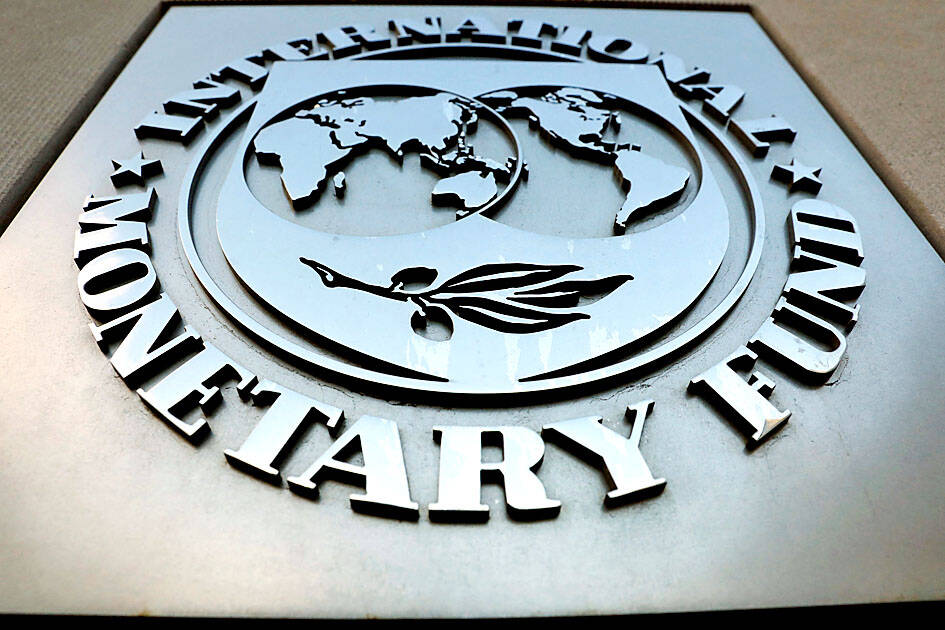Global public debt is expected to reach a record US$100 trillion this year, the IMF said yesterday, warning that the fiscal outlook for many countries might be even “worse than expected.”
In its latest report on fiscal policy, the IMF said it expects global public debt to hit 93 percent of global GDP this year, and to approach 100 percent of GDP by 2030 — 10 percentage points higher than in 2019, before the COVID-19 pandemic.
“Global public debt is very high,” IMF Fiscal Affairs Department deputy director Era Dabla-Norris told reporters ahead of the report’s publication.

Photo: Reuters
“There are very good reasons to believe that the debt burden — or the debt outlook — could be worse than expected,” Dabla-Norris said, pointing to spending pressures to address issues such as climate change, overly optimistic debt projections and the possibility of large amounts of unidentified debt.
“So the bottom line is that it’s time for countries to get their fiscal house in order,” she said.
The IMF report introduced a new “debt at risk” approach to assessing the risks to debt projections.
It estimated that, in a worst-case scenario, global public debt could hit 115 percent of GDP by 2026 — almost 20 percentage points higher than the IMF’s baseline estimate.
The report found that “global factors increasingly drive the fluctuations in government borrowing costs across countries,” suggesting that elevated levels of debt in key countries could “increase the volatility of sovereign yields and debt risks” for others.
Moderating inflation and interest rate cuts in many economies meant now was an “opportune” time for countries to rebuild their fiscal buffers, the IMF said, adding that they were “better placed” than before to absorb the effect of fiscal tightening.
The size of the fiscal adjustment needed to bring global public debt back under control was between 3.0 and 4.5 percent of GDP, on average, it said — almost twice the size of past adjustments.

In Italy’s storied gold-making hubs, jewelers are reworking their designs to trim gold content as they race to blunt the effect of record prices and appeal to shoppers watching their budgets. Gold prices hit a record high on Thursday, surging near US$5,600 an ounce, more than double a year ago as geopolitical concerns and jitters over trade pushed investors toward the safe-haven asset. The rally is putting undue pressure on small artisans as they face mounting demands from customers, including international brands, to produce cheaper items, from signature pieces to wedding rings, according to interviews with four independent jewelers in Italy’s main

Japanese Prime Minister Sanae Takaichi has talked up the benefits of a weaker yen in a campaign speech, adopting a tone at odds with her finance ministry, which has refused to rule out any options to counter excessive foreign exchange volatility. Takaichi later softened her stance, saying she did not have a preference for the yen’s direction. “People say the weak yen is bad right now, but for export industries, it’s a major opportunity,” Takaichi said on Saturday at a rally for Liberal Democratic Party candidate Daishiro Yamagiwa in Kanagawa Prefecture ahead of a snap election on Sunday. “Whether it’s selling food or

CONCERNS: Tech companies investing in AI businesses that purchase their products have raised questions among investors that they are artificially propping up demand Nvidia Corp chief executive officer Jensen Huang (黃仁勳) on Saturday said that the company would be participating in OpenAI’s latest funding round, describing it as potentially “the largest investment we’ve ever made.” “We will invest a great deal of money,” Huang told reporters while visiting Taipei. “I believe in OpenAI. The work that they do is incredible. They’re one of the most consequential companies of our time.” Huang did not say exactly how much Nvidia might contribute, but described the investment as “huge.” “Let Sam announce how much he’s going to raise — it’s for him to decide,” Huang said, referring to OpenAI

The global server market is expected to grow 12.8 percent annually this year, with artificial intelligence (AI) servers projected to account for 16.5 percent, driven by continued investment in AI infrastructure by major cloud service providers (CSPs), market researcher TrendForce Corp (集邦科技) said yesterday. Global AI server shipments this year are expected to increase 28 percent year-on-year to more than 2.7 million units, driven by sustained demand from CSPs and government sovereign cloud projects, TrendForce analyst Frank Kung (龔明德) told the Taipei Times. Demand for GPU-based AI servers, including Nvidia Corp’s GB and Vera Rubin rack systems, is expected to remain high,